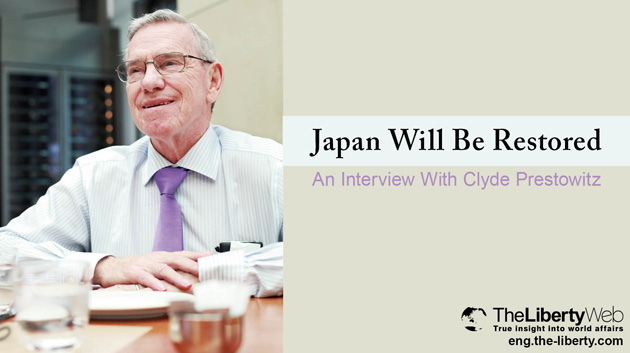Japan Will Be Restored
An Interview With Clyde Prestowitz
It is the year 2050. Having achieved an economic growth rate of 4.5% Japan now has a GDP of ¥1.5 quadrillion; they have become a world leader in the robot and medical technology and business; the population has exceeded 150 million; and it has become a bilingual community that can now reveal its wonders to the world through the English language. This is the future of Japan that Clyde Prestowitz envisions in his book “Japan Restored”. We interviewed Prestowitz on why he wrote the book, and any points Japan should take into consideration in matters of diplomatic relations.
Biography
Clyde Prestowitz is the Founder and President of the Economic Strategy Institute.
Born in 1941, Prestowitz completed his B.A. at Swarthmore College and an M.A. in East-West Policies and Economics from the East-West Center of the University of Hawaii, and later an M.B.A. from the Wharton School of the University of Pennsylvania. He was a negotiator with Tokyo while he served as Counselor to the Secretary of Commerce in the Reagan Administration. He is currently the President of the Economic Strategy Institute.
Why Write “Japan Restored”?
Interviewer (I): In your book “Japan Restored”, you depicted Japan in 2050 as a role model for other countries. What was your purpose in writing such a book?
Prestowitz (P): When I was part of a project in 2011 that compared the car industries of Japan and South Korea, I suddenly realized that Japan was having many problems. The Japan I knew since the 1960s had changed, and this change was not a good one.
For example, there is the population problem. I have been analyzing economic trends on a world-scale for 30 years: how America, Japan, China and Europe were changing over long spans of 15, 20, or 35 years. Currently, society in Japan is a very comfortable place, but since the population is rapidly aging and it is decreasing due to the low birthrate, it is doubtful whether this comfortable society can continue for much longer. I have had a long relationship with Japan and wanted the Japanese people to become more aware of the problem and of some possible solutions.
So I thought about how to restore and revitalize Japan, and put it together into a book. If Japan executes the deregulations and reforms I proposed in the book, the GDP could possibly reach ¥1.5 quadrillion by 2050.
Prestowitz’ Vision for Japan
(I): In your book, you presented crises that Japan may face in heading towards reform, such as the Senkaku Islands being overtaken by China and Okinawa’s independence declaration. Why did you do this?
(P): Looking back over the last 150 years, Japan has undergone two self-reformations: the Meiji restoration and in the post-WWII period. People cannot change unless they face a big crisis. So I thought about possible crises that may induce reform: crude oil stops arriving due to disputes in the Persian Gulf, the U.S. Seventh Fleet retreats to Hawaii, Abenomics fails, volcanoes erupt. People will have to come up with new policies in response to these crises.
(I): Since after the Cold War, the U.S. has been building unipolar rule. Nowadays, we think of the world as a multipolar world. What sorts of policies do you think Japan should adopt in a multipolar world?
(P): A multipolar world is, in other words, a world where the U.S. lessens its power. This, however, does not mean that America will lose its ability to control the world. In 1992, after the end of the Cold War, there was no one who could challenge America. America was the hope of the world. We can say that Russia, China and India gained power, with a relative power balance to America. This meant that America could no longer face these countries with over-whelming power. And these countries that rose influenced other countries: with Russia it was Germany and Poland, and with China it was Japan. It is now a time for other countries to consider whether to expect America to continue as the only country providing security against the menace of China and Russia; or whether these other countries should step up and play a bigger part in their alliance to America so the security protecting can continue. They must even think about whether it is even possible for America to continue the security protection; whether America will be satisfied and able to bear the human and financial costs.
Prestowitz on Trump and Sanders
(I): Some people call Donald Trump an authoritarian. What are your thoughts on that?
(P): I can’t agree with much of what Trump says, but sometimes he does make correct criticisms. We have to recognize that the public understands that in some cases his comments are correct. . And Trump isn’t the only one making some of the criticisms.
Bernie Sanders, for instance, criticizes that America hasn’t been investing in its own infrastructure and education, but has been spending money on the Middle East, the Far East and Europe instead. But this does not mean that he will renounce his duties for the treaty, nor does it mean he has abandoned the world. He is trying to change America’s pivot. Some people criticize this as authoritarian to lower his reputation, but this is attaching labels.
The U.S.- Japan Alliance
(I): What do you think about the future of the U.S.-Japan alliance?
(P): I think the alliance will continue to be important. It is also important to construct a double-layered alliance with other countries such as the Philippines and Vietnam, India and South Korea and so on, like PM Abe is trying to do.
(I): Most people think that the U.S. will not allow Japan to hold nuclear weapons. How do you think of this?
(P): Japan is a sovereign state. So America can’t just dictate Japan’s policy. Today, Washington would probably oppose nuclear arms for Japan, but it also opposed India’s development of nuclear weapons. However, that opposition did not stop India from obtaining nuclear weapons. Nor did it stop Pakistan or North Korea. So the real question is not so much what America wants but rather what is it that Japan wants.
Abenomics and Restructuring Japan for the Future
(I): What is your opinion on Abenomics?
(P): I wish Abe could be bolder. I think Abenomics will fail due to insufficiency. Yet, I sympathize with Abe because the political situation may not allow him to take bigger action.
(I): What do you mean by “insufficient”?
(P): I think Japan is in need of a radical restructuring revolution. For instance, Abe is promoting a society with more working women in his policy. This is a good step, and Abe has been calling for more pre-schools, but compared to France and Sweden, women in Japan find it much harder to return to the workforce after having children.
When I lived in Japan in the 1970s, foreign-affiliated firms such as McKinsey and Goldman Sachs were having trouble finding Japanese workers. Now, Japanese women favor these firms. Why? Because the firms do not adopt a seniority system. In these firms, people get paid for how well they work, not for their age or level of education. I think that the payment methods used in foreign-affiliated firms should be more widely adopted in industries in Japan.
On the contrary, Japan has a system where wages gradually rise, and a lot of the time, superiors do not even do work evaluations. There needs to be a proper evaluation criteria, not stupid things like going to golf together or personal opinion.
Japan is a centralized government, and so everything is decided in Tokyo. I remember the governor of Osaka bemoaning that they needed approval of the central ministries just to change the look of a ‘stop’ sign. Also, in Tokyo we don’t see young so many young people starting new businesses. Of course, there are more than in earlier years, but still not so many.
Banks tend not to lend money to start new businesses, and this is because in Japan, people are not given a second chance after failure. Some people respond saying, “that’s because Americans are just risk-takers”. With risk-taking, Americans are the same as people from other countries. It’s just that they are given a second chance even if they fail the first time. If they fail, they can just try again.
I think Japan needs a restructuring revolution in these areas. And to cause revolution, there need to be crises.



















